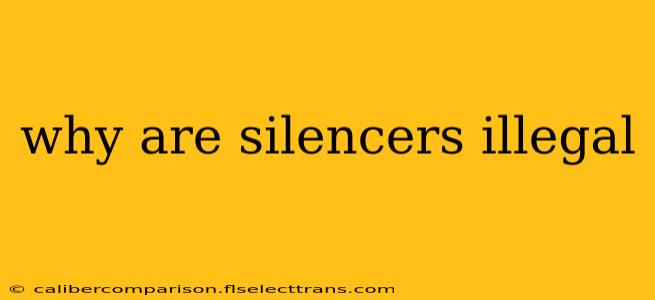Silencers, also known as suppressors, are devices that reduce the sound of a firearm. While their use in movies and television often portrays them as tools of stealth and espionage, the legal reality is far more complex. The illegality of silencers in many jurisdictions stems from a confluence of factors, including public safety concerns, potential misuse, and historical regulatory decisions.
The Public Safety Argument: A Key Driver of Silencer Restrictions
A primary concern driving the illegality of silencers in many places is their potential to increase the risk to public safety. The reduced sound of a gunshot fired with a silencer makes it harder to pinpoint the source of the shot, hindering law enforcement's ability to respond effectively and potentially allowing criminals to operate with greater impunity. This lack of immediate audibility can lead to increased instances of violence and make it more challenging to investigate crimes. The argument isn't about completely eliminating gunshots, but rather about the significant advantage silencers offer in concealing criminal activity.
The "Stealth Factor" and its Implications
The ability to mask the sound of a gunshot contributes significantly to the argument against silencers. This concealment facilitates covert actions, making it easier to commit crimes undetected and potentially increasing the lethality of attacks. The potential for increased crime rates and the challenges posed to law enforcement in apprehending perpetrators are central concerns driving restrictive legislation.
Historical Context and Regulatory Evolution
The regulations surrounding silencers often have deep historical roots. Many regulations were enacted long before the modern understanding of firearm acoustics and suppressor technology. These regulations were frequently put in place based on perceived threats rather than extensive scientific analysis. This legacy contributes to the current legal landscape and the complexity of reforming outdated laws.
The National Firearms Act (NFA) of 1934 and its Impact
In the United States, the National Firearms Act (NFA) of 1934 played a critical role in regulating silencers. This act imposed strict controls on various firearm accessories, including silencers, requiring registration and substantial taxation. The act was passed during a period of heightened concern about organized crime, and silencers were perceived as tools that facilitated criminal activities. The NFA's legacy continues to shape the legal framework governing silencers today.
The Misconception of Complete Silence
It's important to understand that silencers don't eliminate gunshots entirely; they merely reduce the sound. While significantly quieter than an unsilenced firearm, a silenced gunshot is still audible, particularly at close range. The reduced noise, however, is enough to generate significant public safety concerns and justify stricter regulatory control.
The Ongoing Debate: Balancing Rights and Public Safety
The debate surrounding silencer legality is complex and multifaceted. Advocates for legal access to silencers often highlight their potential use for hunting, recreational shooting, and hearing protection. They argue that responsible firearm owners should have the right to utilize such devices safely. However, these arguments are often weighed against the potential for misuse and the significant public safety concerns discussed above.
Conclusion: A Balancing Act
The illegality of silencers in many places is not simply a matter of arbitrary restriction. It is a reflection of serious concerns about public safety, the potential for increased criminal activity, and the challenges posed to law enforcement. The historical context and ongoing debate surrounding silencers demonstrate the complexity of balancing individual rights with the need to protect communities from violence. The legal landscape will likely continue to evolve as technology advances and as society reevaluates the risks and benefits associated with this technology.

